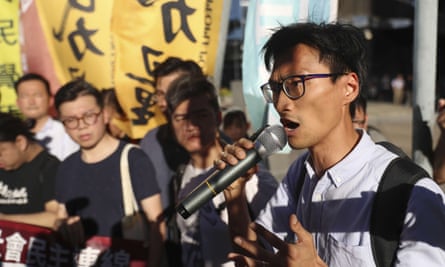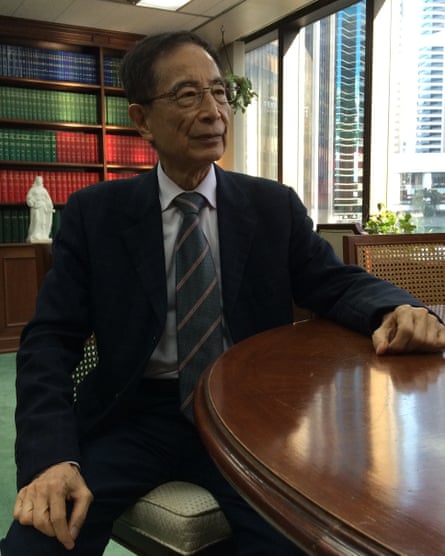For President Xi Jinping, the 20th anniversary of Hong Kong’s return to China is a moment to toast the reunification of a nation and hail its unstoppable rise. But for activists such as Eddie Chu, one of the leading lights of a new generation of pro-democracy politicians, it has become an occasion for something quite different.
“Boot-licking. Unprecedented boot-licking!” he says, a smile breaking across his face as he reflects on how many members of the local elite have chosen to mark two decades of Chinese rule by plastering their homes and businesses with patriotic slogans and red flags in the hope, he suspects, of currying economic favour.
“That is quite the opposite of what Hong Kong people wanted to see in 1997. We wanted to see democracy. Democracy is not boot-licking.”
On Saturday morning, China’s authoritarian ruler, who is making a rare three-day tour of the former British colony, will lead celebrations of two decades of Chinese control alongside Hong Kong’s incoming chief executive, Carrie Lam.
At a flag-raising ceremony just down the road from where the umbrella “revolution” happened – an unprecedented eruption of dissent in the autumn of 2014 – the pair will remember the moment this city of 7.3 million residents returned to China after 156 years of colonial rule. A flypast and a sea parade will follow. By night, the skies over Victoria harbour, from where the royal yacht Britannia departed on 1 July 1997, will be illuminated by a spectacular 23-minute blaze of fireworks.
“The moving occasion of Hong Kong’s return to the motherland … like a long-separated child coming back to the warm embrace of his mother, is still vivid in our memory,” Xi told a dinner on Friday night.
But for members of Hong Kong’s democracy movement, the anniversary is accompanied by a profound sense of uncertainty and trepidation.

Twenty years after Britain’s departure thrust this hyperactive lair of capitalism into the hands of a Leninist dictatorship, campaigners such as Chu fear Beijing is preparing to up the ante in its battle for control.
Ten pro-democracy legislators, of which he is one, are at risk of losing their jobs as a result of government-backed legal challenges against them. There are fears that under Hong Kong’s new leader, who was elected by a tightly controlled selection committee, there will be a renewed push to enact controversial anti-subversion legislation.
And while Xi has sought to strike an upbeat tone during his visit, recent comments by another senior Communist party figure – who vowed to consolidate China’s control of the former colony – has put activists on edge.
“The relationship between the central government and Hong Kong is that of delegation of power, not power-sharing,” Zhang Dejiang, China’s number three official, said, adding that Hong Kong could only be governed by those who posed “no threat to [its] prosperity and stability”.
Feeding into activists’ sense of foreboding is the feeling that many western governments have now cut them loose for fear of damaging their economic relationships with the world’s second largest economy.

The foreign secretary, Boris Johnson, issued a carefully worded statement about the anniversary on Thursday, saying it was “vital” that Hong Kong’s autonomy be preserved. But Johnson made no direct mention of growing fears about the erosion of Hong Kong’s freedoms, or even of Beijing’s alleged abduction of a local bookseller who held a British passport.
“The British government is just awful. I’m afraid I cannot find any kind words to say about that,” says Martin Lee, a 79-year-old barrister who is the elder statesman of Hong Kong’s democracy movement.
Like many, Lee is convinced that China is gradually stripping away the freedoms promised to Hong Kong’s citizens under the “one country, two systems” formula – and that Britain has done nothing to intervene.
On Friday, a spokesperson for China’s foreign ministry appeared to confirm those fears, telling reporters that the joint declaration, a deal negotiated by London and Beijing guaranteeing Hong Kong’s way of life for 50 years, “was a historical document that no longer had any practical significance”.
Suzanne Pepper, a veteran chronicler of the city’s quest for democracy, says campaigners can no longer count on London or Washington for support: “As long as there is not blood in the streets, they don’t care.”
Not everybody is lamenting Saturday’s landmark anniversary, however. The streets around Xi’s waterfront hotel are dotted with clusters of pro-government supporters and decorated with banners that read “I love Hong Kong” and “One country, two systems has the strong vitality”. Lilac posters hanging from bridges and lampposts carry the celebrations’ official catchline: “Together. Progress. Opportunity”. Skyscrapers have been decked out in bright red banners and neon displays that read: “Warmly celebrate the 20th anniversary of Hong Kong’s return to China.”
Amid the omnipresent propaganda, there is also genuine patriotic fervour. “Hong Kong people should … be proud of the achievements of the motherland and all the progress our country has made,” enthused Li Li, a guide at a government-sponsored exhibit about China’s space programme that has been erected in Victoria Park to coincide with this week’s party.
Many more have greeted the anniversary and the presidential visit with nonchalance.
Chu estimated that about a third of the population was split between pro-democracy and pro-government supporters. The rest “couldn’t care less” about the anniversary, and were most worried about the traffic jams caused by the massive security operation to protect Xi.
Swaths of the city’s waterfront are sealed off with towering white and blue barricades, with agents patrolling the streets with assault rifles in their hands. “Too many police!” jokes one of hundreds of officers patrolling the area, sweat beading on his neck.
Lee says the lack of interest many young people are showing in Xi’s visit underline how disconnected they feel from mainland China and how Beijing’s policies have lost their “hearts and souls”.
“‘Oh, this is the ruler of a neighbouring country’ – that’s what they feel,” he says, pointing to a recent poll suggesting that only 3% of 18-to-29-year-olds consider themselves Chinese, the lowest rate since 1997. “The young people want democracy. They don’t want to be brainwashed.”
For all the indifference and uncertainty, Hong Kong’s protest movement appears in buoyant mood. Tens of thousands are expected to turn out on Saturday afternoon for an annual march marking the return to China. Their rallying cry will be “Twenty years of lies.” “[It] was going to be ‘Communist party officials, get out of Hong Kong’, but they decided that was a bit too provocative,” says Pepper.
Last September, a record number of young anti-Beijing activists were elected to Hong Kong’s legislative council, or Legco, in what one victor called a democratic “miracle”. However, many of them could now be forced from office, mostly because of government legal challenges over protests the activists took part in while being sworn in last year.
“If two to three of them lose their seats, then the whole political balance will change totally, and then Beijing will have absolute control of this legislature,” warns Chu, who was to shout “Democracy and self-determination” and “Tyranny must die” while taking his oath.

Pepper said she was not optimistic that Beijing would offer concessions to activists, even though Hong Kong’s incoming leader has pledged to “heal the divide” and build bridges. “This is a bridge between democracy and dictatorship,” said Pepper. “How she is going to bridge that, I don’t know.”
Chris Patten, Hong Kong’s last governor, has offered a more upbeat appraisal of the city he once ran, saying he was encouraged by the “really profound sense of citizenship” of its young activists. “Above all, I think I am pleased about the way in which Hong Kong people themselves are the reason for it still being a cause of optimism rather than pessimism.”
Lee, who is famed for an impassioned defence of democracy that he gave after Britain’s withdrawal, says he is an “eternal optimist” about his movement’s chances under a new, young leadership. ”These young people are our hope for the future. I’m very proud of them.”
Sitting in his chambers between a bust of Winston Churchill and a statuette of the Goddess of Democracy, the symbol of the 1989 Tiananmen Square protests, Lee remembers strolling through the umbrella movement’s main camp, a sprawl of tents and political debate, three days before police finally cleared it, in December 2015.
“There were two little birds singing on the ground. [It was as if they were saying:] ‘I wish I were free’, you know? The air was fresh,” he reminisces. “I miss those days.”
Additional reporting by Benjamin Haas and Wang Zhen.